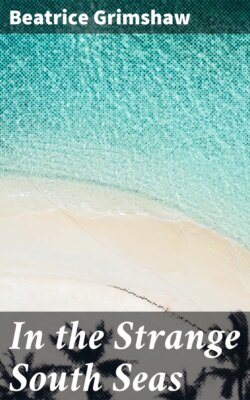Читать книгу In the Strange South Seas - Beatrice Grimshaw - Страница 3
На сайте Литреса книга снята с продажи.
CHAPTER I
ОглавлениеTable of Contents
Fate and Her Parcels—How It All came true—The First South Sea Island—Coleridge and the Tropics—The Spell of the Island Scents—What happens to Travellers—Days in Dreamland—A Torchlight Market—The Enchanted Fei.
LIKE an idle messenger-boy, Fate takes a long while about her rounds, but she will get through with them and deliver all her parcels, if you give her time enough.
She has so much business that she confuses orders very often, and you are never sure of getting what you sent for. Still, you will certainly get something, if you wait, and it may even be the thing you demanded.
The morning she called at my door, with a very full basket, she had already been to my neighbours, and given them, in a big assortment of goods—a failure on the Stock Exchange, a hunting accident, and a broken engagement. What they had ordered was a seat in Parliament, and a winter at Monte Carlo, with anything good that might come in in the way of new-laid motor-cars. But Fate was, as usual, in a hurry, and she never changes any goods, once delivered. So they had to take them in.
I had given up expecting her when her knock came to my door, because my order had been sent in some years ago, and so far had remained unacknowledged. But she fairly emptied her basket into my hands, once she was admitted.
“Goods all right, and none the worse for keeping; couldn’t find time to see to you before, I’ve been so busy attending to an order from Japan for a new army and a gross of assorted victories,” she panted. “Had to serve the Czar of Russia with a lot of old defeats I’ve had lying by since the Crimea, instead of the new empire he sent for; and can’t get time to fill more than half the German Emperor’s order for fireworks. You private people are lucky to get anything at all. Count the goods, please—one journey round the world, two-and-a-half years of mixed adventures, a hundred South Sea Islands, threescore new friends, first quality, one large package luck. That’s all, I think—sign the book, and let me go; I’ve got seven attacks of appendicitis, a foreclosed mortgage, two lawsuits, and a divorce, to deliver in this square before lunch.”
So, like the fairy tales, “it all came true,” and one bright winter afternoon a Cunard liner bore me away from the streets and shops and drab-coloured, huddled houses of Liverpool, down the muddy Mersey—off round the world.
There were thousands of people on the quay, come to see the famous boat away, for it was Saturday afternoon, and the town took holiday. They had a few hours of freedom before them—then, the airless office room, the stuffy shop, the ledger and the copying-press, and the clattering typewriter, the grim window giving on the dark wet street, for six long days again. Next year, and the year after,-just the office, the frowsy lodging, the tram car, the pen in the strong young fingers, the desk to stoop the broad young shoulders, the life foreseen, eventless, grey for ever and for ever. And I was going round the world.
It is three weeks later, and the big “A and A” steamer is ploughing along in the midst of a marvellous dazzle of diamond-spangled, pale-blue tropic sea and scorching, pale-blue tropic sky. The passengers, in cool white suits and dresses, are clustered together on the promenade deck, looking eagerly over the port railing, while the captain, telescope in hand, points out something lying only a mile away, and says: “That’s Tiki-Hau, so now you’ve seen a South Sea Island.”
We are on our way to Tahiti, a twelve-day run from San Francisco, and are not stopping anywhere, but as Tiki-Hau is the only glimpse of land we shall get until we cast anchor in Papeete, every one wants to look at it. Not one of us has ever seen a South Sea Island, and, we are all eager to realise this little fragment of our rainbow-coloured childish dreams.
Is it as good as we dreamed it? we ask ourselves and each other. The verdict, given unanimously, is: “Yes—but not the same.”
Here is no high green palmy peak, overhanging a waveless sea, with sparkling waterfalls dashing down from crag to crag, like the coloured illustrations in our old school prize books. There are, indeed, just such islands in the Pacific, we are told—many hundreds of them—but there are still more of the kind we are now looking at, which is not half so often mentioned. All South Sea Islands are either high or low; the high island, with lofty mountains and dark, rich volcanic soil, is the familiar island of the picture book, while the low type, composed only of coral, is the variety to which Tiki-Hau belongs.
